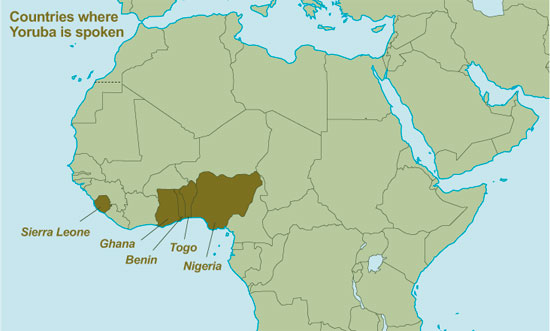I'll answer your question, but first I'll object to the past tense in it. While it's true that some of Scion's pantheons come from religions that are functionally dead, especially the really old ones like the Anunna or Pesedjet, the worship of the Orisha is alive and kicking; there are estimated to be a few million practitioners of Orisha worship in western Africa even in the modern day, though some of their traditions have been understandably colored by syncretization with and influence from Islam and Christianity.
The Orisha are the gods of the religion of the Yoruba people, an ethnic group that is still very much alive and active today. The Yoruba ethnic group spans a fairly large area in western Africa, mostly covering Nigeria, Togo, Benin and some adjacent territories. Their traditional territory doesn't conform to any country lines because, unlike most country borders farther north, the states in Africa were carved out by colonizing imperialists from Europe instead of according to ethnic groups and traditional boundaries.

As you can see, they take up a pretty good chunk of the African landscape - about the same size as Germany and Austria combined, give or take a little - but are nowhere near being in charge of the whole continent. Which of course makes sense; we may be predisposed to think of Africa and African gods as some kind of Lion King-esque conglomeration of a single culture over the continent, but guys, Africa is huge. Before the invasions from the north, it probably had more distinct ethnic groups and tribal religions than Europe ever did.
In the modern day, Orisha worship is no longer that widespread; the map above shows where the Yoruba people traditionally live, but Sierra Leone and Ghana have pretty much ceased practicing the religion much due to evolving cultures and outside influences, leaving the core of the gods' territory in Nigeria, Togo and Benin. But while that's probably pretty saddening for the gods of the western coast, they've more than made up for it by expanding like crazy motherfuckers all over the rest of the world. The Orisha, in various forms, are worshiped all over the western world, from their dominating power in Brazil and the Caribbean islands on up to their famous vodun incarnations in Haiti and the southeastern United States. If there's one thing you can say about the Orisha, it's that they have staying power; being thoroughly and ruthlessly colonized by Europe not only didn't stamp out the religion on the home front, it actually enabled them to spread all over new territories and become a thriving religious force in the modern world.
The Yoruba religion also influenced several of its neighbors, most notably the Fon, and you'll find traces of them all over western Africa as a result, even in areas where they aren't traditionally worshiped. Shango is, after all, always on the lookout for opportunities for glorious conquest.

Awesome answer, and sorry for the past tense...
ReplyDeleteMakes me interested to hear and see what other pantheons lie hidden in the 'dark continent'.
Naw, it's all good. :)
DeleteThere are tons of African pantheons, although some are small enough that Scion may not play well with them (it's hard for a pantheon of only three or four gods to compete with the Dodekatheon, right?). I'd love to have the chance to see more of them down the road.
I've not heard of this religion spreading in Europe or anything?
ReplyDeleteNot in the same way, no. Europe imported only a fraction of the huge numbers of Africans who were taken as slaves to the Americas, so the Americas naturally developed a lot more African cultural traditions and religion than did Europe. It does exist, usually in small pockets of worshipers (the London Lucumi Choir, a traditional Yoruba music group, is fairly famous, actually), but there's no corresponding big name religion.
DeleteAsia's the same story - almost none of the Yoruba who were taken as slaves were sent to Asia (a few probably went to India, but let's be real, it was easier for British overseers to just force Indians to do the work anyway), so there's little to no cultural influence from them in that direction.